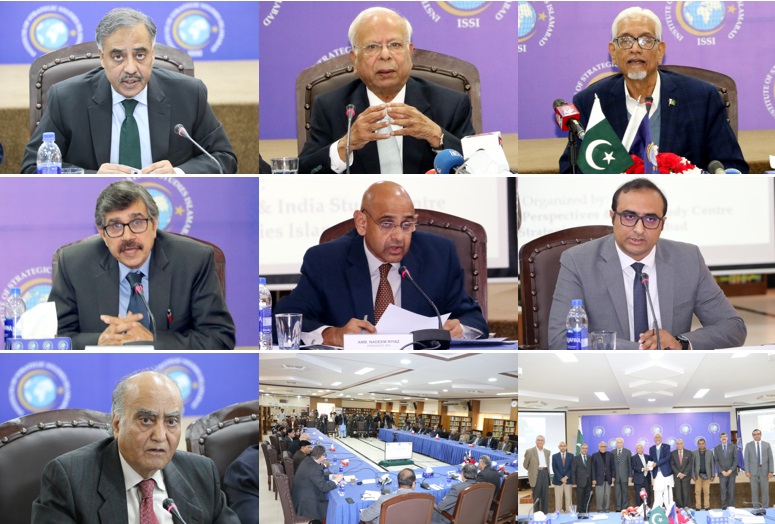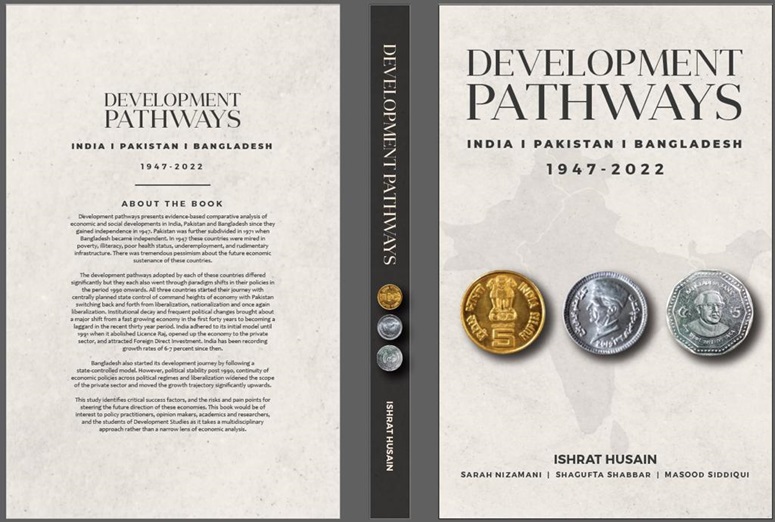PRESS RELEASE
ISSI Launches Dr. Ishrat Husain’s Book, “Development Pathways: India -Pakistan-Bangladesh (1947-2022)”
November 20, 2023


The Centre for Strategic Perspectives and India Study Centre at the Institute of Strategic Studies Islamabad (ISSI) organized an event to launch a Book, titled “Development Pathways: India-Pakistan-Bangladesh (1947-2022)” authored by Dr. Ishrat Husain. The event was attended by eminent members of foreign and civil services, academia, civil society, media, and the diplomatic corps in Islamabad. Adviser to the Prime Minister on Finance, Dr. Waqar Masood Khan, was chief guest on the occasion.
DG ISSI Ambassador Sohail Mahmood, in his welcome remarks, introduced both the author and the Book. He highlighted Dr. Ishrat’s six decades of distinguished public service and contributions for economic and institutional reforms – including a consistent emphasis on political stability and policy continuity for sustainable long-term development. Ambassador Sohail Mahmood also lauded the author’s direct and accessible writing style, making complex economic issues and policy debates more understandable to readers across a broad spectrum. He noted that given the rich data sets of the three countries were contained in the Book, it could serve as a solid foundation for further studies on the economic trajectories of India, Pakistan and Bangladesh. The most valuable aspect of the Book, according to him, was the chapter dealing with risk factors and “pain points” for the future. He also pointed out that the Book made it clear that sound economic management alone did not produce the desired effect and that investing in social and human development was an imperative, which would also enhance the dividends manifolds. In conclusion, he described the Book as a valuable contribution to the existing literature and a source of thought-provoking ideas on a range of subjects.
Ambassador Nadeem Riyaz, President of the Institute of Regional Studies (IRS), shared his thoughts on Dr. Ishrat Husain’s Book. He praised the author for his sound academic work and gave a detailed account of the major subjects covered in the Book. These included macroeconomics, balance of payments, remittances, human development, social protection, service deliveries, poverty reduction, digitalisation, labour market, and applications of emerging technologies. Ambassador Riyaz particularly focused on the Book’s extensive conclusions. He recommended that Pakistan should concentrate on addressing the instability and unpredictability in the economic realm. He highlighted that all three countries had heavy regulations and administrations, problems with start-ups, and issues of taxation that continue to restrict small and medium enterprises. Lastly, Ambassador Nadeem Riyaz commended the author for the valuable effort to sum up the long period of 75 years.
Dr. Idrees Khawaja appreciated the author’s efforts in writing this timely Book. Dr. Khawaja also praised the author for including young co-authors. He gave a summary of the Book, explaining that it compared the economic performances of three countries with similar histories and backgrounds. He lauded the author for analyzing the factors behind the divergent economic growth trajectories of these countries. Dr. Khawaja also shared his own analysis of the Book and asked thought-provoking questions about the various themes taken up in the comparative analysis. He also recommended studying the different patterns of foreign assistance for Pakistan that appeared in the 1960s, 1980s and 2000s. In his opinion, the primary reason for the slowed development of Pakistan was due to the practice of ‘rent-seeking’ and corruption.
Dr. Ishrat Husain shared how the Book evolved, as the subject was considered essential for understanding the present and projecting the future. The Book talked about the changing times for Pakistan, India, and Bangladesh. He noted that Pakistan was once considered a role model for developing countries, while Bangladesh was referred to as a ‘basket case’ and India was struggling with poverty, illiteracy, and other social issues. However, the situation had now significantly changed and India and Bangladesh fared relatively better, while Pakistan was facing challenges. Dr. Ishrat also dilated on the challenges he faced in finding comparable data from all three countries spanning from 1947 to 2022. He highlighted the “five shocks” that affected Pakistan’s economy — from refugee influx in 1947 to war in Afghanistan; and identified “8 critical success factors”, including the forms of government, the role of women, and urbanization, among others. He also discussed the “Risks and Pain Points” for the next 25 years for the three countries – including addressing climate change; enhancing intra-regional trade; ensuring inclusive growth and reducing inequality; managing urbanization; and tackling institutional decline. Dr. Ishrat concluded by emphasizing the need for improving governance structures to ensure sustained and inclusive economic growth and development.
Dr. Waqar Masood Khan, Adviser to PM on Finance, lauded the author and co-authors for their contribution to addressing the knowledge gap in this field. In particular, he applauded Dr. Ishrat’s devotion and motivation for the subject. The Book’s choice of subjects and focus was also underscored by Dr. Khan, who believed that it would substantially assist experts and practitioners. Dr. Waqar Masood added that the Book rightly addressed the convergences and divergences between the three economies, as he termed the 1990s as the turning point for the three economies. He explained that this shift was due to globalization, liberalization, and the end of the Cold War. He highlighted some of the challenges faced by Pakistan and India, such as administrative matters, infrastructure, small industry, and investment. Dr. Khan addressed the regulatory bodies in all three countries and positively evaluated their functioning. He believed that South Asia had moved past the traditional approach towards economic development and become somewhat predictable. Dr. Khan recommended building up reserves, which he felt served as the critical component of any economy.
The engaging session was followed by a lively Q&A session. In the end, Ambassador Khalid Mahmood, Chairman of BoG ISSI, presented a vote of thanks expressing gratitude to the speakers for their insightful inputs on the Book.












